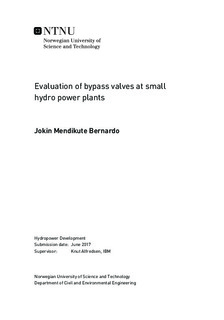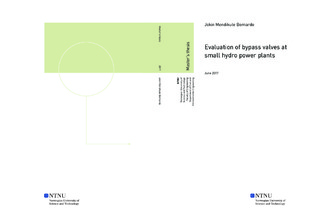| dc.description.abstract | Hydropeaking has adverse effects on river ecosystems which are likely to increase as hydropeaking increases. Bypass valves are extensively used in Norway to mitigate the sudden changes in water discharge, and this thesis aims to evaluate their performance. Literature focusing on fish stranding is selected to provide a background on the acceptable changes. Stop/restart scenarios where carried out in five small power plants of different characteristics, measuring discharge, water stage and temperature changes in various points along the affected river reaches.
Results are compared to parameters provided by the EnviPEAK project, resulting in high risk scenarios in most of the cases. A digital model of one of the sites is also tested with different operating strategies, obtaining basic approaches to steer the bypass valve better.
It is concluded that bypass valves have potential to mitigate adverse effects caused by hydropeaking, but better operation is needed. | |

